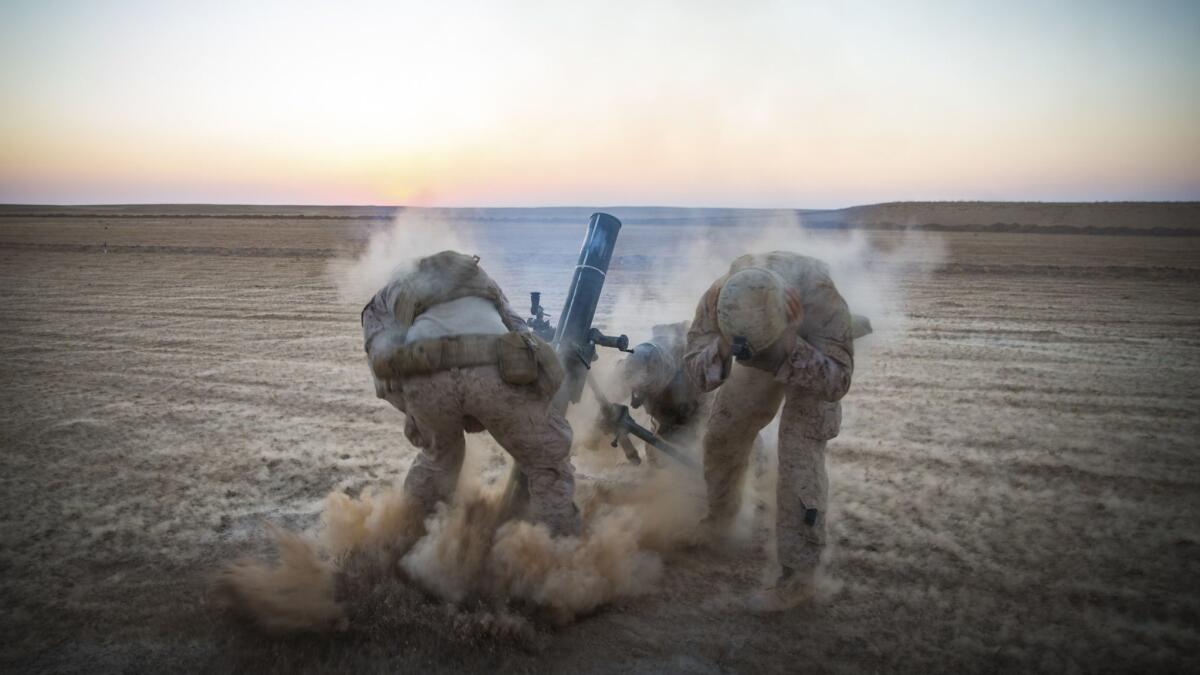Op-Ed: Why Trump is right about withdrawing from Syria

- Share via
On Wednesday, the White House ordered the Pentagon to pull all U.S. troops from Syria immediately. President Trump tweeted: “We have defeated ISIS in Syria, my only reason for being there during the Trump presidency,” a stance that immediately received pushback from more interventionist lawmakers. In addition to the decision to pull out of Syria, made last week, a senior Pentagon official suggested that troop reductions in Afghanistan are also under discussion.
Although this might seem like another one of the President’s impulsive decisions, this move should be welcomed. Trump — and his voters — have wanted to leave Syria for a long time, and are finally getting their way.
The administration’s move to get out of Syria, and consider a similar path in Afghanistan, makes mission creep less likely. Given the volatility of the Middle East, there will always be some reason or another to justify a U.S. troop presence in as many countries as possible, whether it is to protect Israel, Saudi Arabia or the Kurds, push back against Iran or Russia, or fight some militant or terrorist group. Some of these goals are definitely worthy, but they can be achieved through diplomacy, surgical strikes, or by working with America’s partners in the region. An expensive, open-ended U.S. troop presence in multiple Middle Eastern countries certainly isn’t necessary to protect our national security objectives.
A lack of U.S. troops in Syria is in no way a surrender or retreat. It is merely the restoration of a previous status quo.
While there are some pockets of ISIS in Syria, the group is largely defeated, possessing only 2% of the territory it controlled at its height in 2015. The remnants can be continuously degraded by aerial bombing by the United States and its allies, as well as ground attacks by Kurdish forces supported and trained by the U.S.
It would be fine for U.S. rivals Russia and Iran to take care of the job. Better for them to spend their time and money fighting ISIS instead of us.
In addition to questioning the counterterrorism value of the administration’s decision, interventionists such as Sens. Lindsey Graham and Marco Rubio have portrayed the administration’s decision as a gift to Iran, Russia, and Hezbollah, the Shiite organization based in Lebanon, because they fear that those actors will fill the strategic vacuum we leave. But an American withdrawal from Syria makes it unlikely that those various factions will work in harmony together. Rather, they will more likely be at each other’s throats, along with Turkey, the Saudi-led Gulf Arab alliance and the Syrian government of Bashar Assad. There already are reports that Russia is trying to edge Iran out of Syria, because of competition for economic projects. Moreover, Iran and Russia have different views on the social future of the country, with Iran promoting greater religiosity and demographic changes that favor Shiite Muslims, and Russia wanting to restore the prewar fabric of Syria.
Additionally, Saudi Arabia and the United Arab Emirates are reaching out to Assad, according to the pro-Syrian regime news outlet Masdar, with an eye to countering Turkey and Iran, which they view as intervening in Arab issues. It is possible Assad himself wants to reduce his dependence on Iran. After all, the secular dictatorship he runs is very different from Iran’s theocratic government, and Syria and Iran’s interests diverge on many regional issues. Rather than emboldening Iran and Russia, an American withdrawal from Syria would shatter the rationale for their cooperation, and could lead to an alignment of regional politics in the Middle East that could be favorable to American interests.
Enter the Fray: First takes on the news of the minute from L.A. Times Opinion »
Before the Syrian civil war, when the Obama administration backed Syrian rebels against the regime of Assad, the United States had almost no influence in Syria, which was already aligned with Iran and Russia. The Russian naval facility in the Syrian port of Tartus dates to 1971. A lack of U.S. troops in Syria is in no way a surrender or retreat. It is merely the restoration of a previous status quo that was not problematic until the war hawks in Washington thought otherwise. Russia is too heavily invested in Syria, its major foothold in the Middle East, to succumb to American pressure to give up on its investment on the Syrian regime.
The alternative would be “a permanent U.S. military presence in Syria (and many other places),” as Rep. Justin Amash, R-Michigan, tweeted. “They justify it with an irrational, unachievable objective: We’ll get out when conflict and terror cease to exist.”
Trump’s announcement of withdrawal from Syria demonstrates that there is another way. The skies won’t fall, and we won’t be fighting ISIS in Kansas if we leave Syria.
Akhilesh “Akhi” Pillalamarri is a fellow at Defense Priorities. @akhipill.
Follow the Opinion section on Twitter @latimesopinionand Facebook
More to Read
A cure for the common opinion
Get thought-provoking perspectives with our weekly newsletter.
You may occasionally receive promotional content from the Los Angeles Times.






